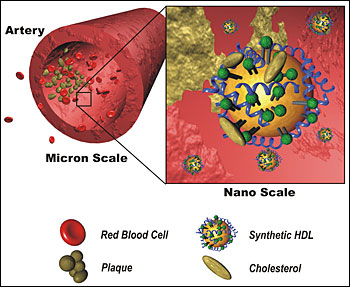"We designed and made a cholesterol sponge. "Synthetic HDL contains the basic properties of an effective anti-cholesterol drug," said Chad A. Mirkin, professor of chemistry in the School of Arts and Sciences.

Fatty holiday foods can, unfortunately, raise blood cholesterol levels sky high. Scientists from Northwestern University (Northwestern University, NU) are now presenting a new and promising weapon - high-density lipoprotein (HDL), the "good" cholesterol - that could help in the fight against chronically high cholesterol levels and against the deadly heart diseases that result from them.
The researchers were able to prepare HDL and showed that their nanoparticle version is able to reversibly bind cholesterol. The synthetic lipoprotein, based on gold nanoparticles, is similar in size to the natural one and effectively mimics the basic composition of the lipoprotein surface.
"We designed and made a cholesterol sponge. "The synthetic HDL contains the basic properties of an effective anti-cholesterol drug," said Chad A. Mirkin, professor of chemistry in the School of Arts and Sciences.
"Drugs that reduce the levels of "bad" cholesterol (LDL) are available on the market and you can lower their blood level through your diet, but it is difficult to increase the levels of your good cholesterol, the HDL," said the lead researcher. "I myself took niacin to try and raise my good cholesterol, but the side effects were so severe that I stopped. We hope that our synthetic HDL can one day in the future help overcome this gap in obtaining an effective cure."
In order to prepare the synthetic product, the researchers started with a gold nanoparticle as the central skeleton. So they coated it with a lipid (fat) that bound to the gold surface, then another lipid and eventually a protein called APOA1, the main protein component found in natural HDL. The final high-density lipoprotein nanoparticles are 18 nanometers in diameter, a size similar to natural lipoproteins.
"Cholesterol is essential for our cells, but its continuous excess can lead to the formation of dangerous plaque in our arteries," says the lead researcher. "HDL transports cholesterol to the liver and thus protects us from atherosclerosis. Our hope is that with further development, our synthetic form can be used to increase HDL levels in the blood and promote better health."
"HDL is a natural nanoparticle and we were able to mimic it successfully," said the researcher. "Gold is an ideal scaffolding material - its size and shape can be designed as we wish, and it can be changed chemically or physically easily. Using gold nanoparticles, which are non-toxic, to prepare synthetic HDL bodes well for the development of new drugs."
The researchers' next step is to further examine the activity of the synthetic HDL under suitable biological conditions and measure its binding rate to cholesterol.

5 תגובות
The original is always better
http://www.northwestern.edu/newscenter/stories/2009/01/mirkinsynth.html
What are the foods that lower cholesterol and what are forbidden
Gold... Gold costs money. If it is not easily excreted from the body and is not lost too quickly - then there is a future even for gold nanoparticles in our medicines.
Thousands of years ago in my bachelor's degree I studied in a course called "Hafasrah". An interesting name for the course and the lecturer, Dr. Zurovsky, is one of the best that the Israeli Academy has known. My memory is generally weak, but if I'm not mistaken, there was a direct connection between bile juices and cholesterol. The word chylomicron also pops into my head. Somehow I remember that a lack of bile juices causes a loss of cholesterol. I wonder if regulating bile juices can lead to regulating the amount of cholesterol (probably not in the ratio between "good" and "bad").
Greetings friends,
Ami Bachar
Interesting article.
Cholesterol is one of the damages of the modern world, our body is not built for these excesses of animal fat that the reality of abundance offers.
What's more, there is still no cure for cholesterol that is lower than the norm, but for the problem of cholesterol that is too low, the doctors say that you should say thank you.
Well done, the question is whether it is practical.